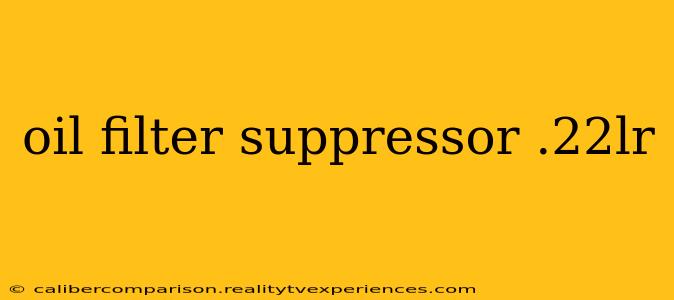The .22 LR caliber is popular for its affordability and versatility, making it a favorite for plinking, small game hunting, and even some competitive shooting. However, the inherent report of even a quiet .22 can be surprisingly loud, prompting many shooters to explore sound suppression options. One intriguing, and often budget-friendly, method involves repurposing an oil filter as a makeshift suppressor. This guide will explore the viability, safety, and legality of using an oil filter as a .22 LR suppressor.
Understanding the Appeal of Oil Filter Suppressors
The allure of using an oil filter as a suppressor is primarily its low cost and readily available materials. Many shooters, especially those on a tight budget, find the idea appealing. However, it's crucial to understand the significant limitations and potential dangers before attempting this.
Potential Benefits (Limited)
- Cost-effectiveness: Oil filters are inexpensive and widely accessible.
- Ease of Acquisition: No special permits or licenses are usually needed to purchase oil filters.
The Critical Downsides: Safety and Legality
Despite the apparent advantages, using an oil filter as a .22 LR suppressor is strongly discouraged due to several critical issues:
Safety Concerns: This is paramount.
- Lack of Proper Construction: Oil filters are not designed to withstand the pressures and heat generated during firearm discharge. Improperly constructed or used oil filter suppressors can fail catastrophically, leading to serious injury or death. Parts of the oil filter could detach and cause harm to the shooter or bystanders.
- Incomplete Sound Suppression: Oil filters offer minimal sound reduction compared to commercially manufactured suppressors. The perceived noise reduction might be negligible, negating the purpose.
- Increased Back Pressure: The restrictive nature of an oil filter can significantly increase back pressure on the firearm's action, potentially leading to malfunctions and damage.
- Inconsistent Performance: The performance of an oil filter suppressor will vary depending on several factors, including the specific filter used and the firearm's characteristics. This unpredictability poses a significant safety risk.
Legal Ramifications: Laws vary significantly.
The legality of homemade suppressors varies widely depending on your location. In most jurisdictions, it is illegal to manufacture, possess, or use a homemade firearm silencer or suppressor, regardless of the materials used. Even if the oil filter itself isn't illegal, its adaptation as a suppressor falls under the same legal restrictions as other homemade suppressors. Always check your local and federal laws before even considering this. Penalties for illegal suppressor possession can be severe.
Safer Alternatives: Invest in proper equipment
If you are seeking sound reduction for your .22 LR firearm, investing in a commercially manufactured suppressor is the safest and most effective solution. These suppressors are designed and tested to meet rigorous safety standards and are legal when purchased and registered according to your region's laws. They offer superior sound reduction, reliable performance, and are significantly safer than makeshift alternatives.
Conclusion: Avoid the Oil Filter Suppressor
While the idea of a low-cost oil filter suppressor might be tempting, the safety risks and legal implications far outweigh any perceived benefits. The potential for serious injury or legal repercussions makes this a practice to avoid completely. Prioritize safety and legality by choosing a commercially manufactured suppressor, if sound reduction is necessary for your shooting activities. Remember to always consult local and federal laws regarding firearm accessories and suppressors before making any purchasing decisions.

